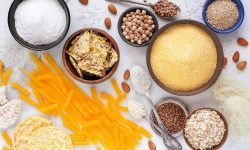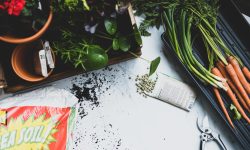Favourite Gluten-Free Items Available at Spud May National Celiac Awareness Month, but every day Spud…
ACT NOW, IDIOTS!
The Intergovernmental Panel on Climate Change (IPCC), a group of leading scientists around the world, recently came out with a frightening message: our global population is causing rapid warming to our planet leading us on a trajectory to ‘climate catastrophe’ if we do not change our behaviour immediately. Said in other words by Kaisa Kosonen from Greenpeace, “Scientists might want to write in capital letters, ‘ACT NOW, IDIOTS,’ but they need to say that with facts…” (1).
We’ve heard this doomsday message for years now, but unfortunately the lack of responsive action from big business and politicians has also remained the same. So if our global leaders won’t step up to the plate and make changes that are necessary to keep this planet livable for our children, we can. Let’s look at the main takeaways from this report and discover what we can do as individuals to make a real difference.

The Take-Aways
The report highlights that in order to save vital ecosystems and species, global temperature rise needs to remain under 1.5°C. We are currently headed towards 3°C of warming. Yikes.
There were four major areas that are identified as the most critical in terms of becoming more sustainable. Dr. Debra Roberts, the IPCC’s co-chair, added that within these four areas “lifestyle changes can make a big difference” (1). These four areas are:
- Energy systems (ie. Renewable energy)
- Land management (ie. Agricultural practices)
- Cities (ie. Transportation)
- Industry (ie. Resource use)
With this in mind, it begs the question of whether there is a lifestyle change that would impact all four of these areas? The answer is yes, and it starts with our grocery list:
1) Buy Local
When you buy food that is grown close to home you make a positive impact to people and planet. Between 6-12% of consumer dollars is spent on the transportation of food from farm to fork (2). These “food miles” account for about 11% of total energy used in the food system (3). Therefore, the less distance your food travels, the more your money goes toward your local community as well as a less energy intensive food system.
2) Eat Less Meat
The topic of meat consumption can be very divisive, but even just reducing your meat intake can have a major impact on land management. Raising livestock at current consumption levels requires a lot of land, which means clearing forests to create pastures. New research shows that without the consumption of meat and animal by-products, land used for agriculture could be reduced by 75% (4). This means less deforestation and more habitats saved. In direct relation to climate change, animal agriculture creates almost one fifth of all greenhouse gas emissions (5). That is more than what is produced from all vehicles, trains, boats and planes combined! (5)

3) It’s Time Your Groceries Start Carpooling
Traditionally, grocery shopping required someone leaving the home and going to the grocery store. Today we have the option to have our weekly groceries come to us. This new option is often celebrated as a huge time saver, but it also can be recognized as a sustainable practice if it is done the right way. For example, when a grocery delivery service offers narrow time windows for delivery, the amount of fuel burned can actually be more than if each individual shopper were to go to the grocery store themselves (6). However, if groceries are ordered online and the delivery of the orders are allowed the flexibility to be dropped off by following the most sustainable & efficient route, fewer cars end up on the road and less fuel is burned (6). In short, by avoiding an activity that most of us hate doing anyway, going out to buy our weekly groceries, we become environmental warriors!
4) Buy Organic
Put on your lab coat because it’s time to get scientific. Organic farming enhances the ability of soil to sequester (store in the ground) CO2– a leading greenhouse gas responsible for climate change. In fact, the benefits of organic farming go beyond just taking CO2 out of the atmosphere. To highlight a few other benefits:
- Soil that is enriched with a higher rate of CO2 improves the productivity of crops, meaning that more food can be grown on less space (7).
- Natural fertilizers, such as manure, and pest-deterrent methods, such as nets and predatory insects are used on fields, reduce the amount of harmful chemicals that can pollute surrounding ecosystems.
Conclusion
The IPCC’s report is scary and seems too big to tackle, but we do have the power as individuals to make the necessary changes to prevent the world from turning into a 24/7 sauna. As food systems author, Anna Lappe writes, “every time you spend money, you’re casting a vote for the kind of world you want”. So, the next time you start to build your grocery list, think of it as a ballot and support a sustainable food system with your dollar.
Sources:
- McGarth, Matt. “Final call to save the world from ‘climate catastrophe’”, BBC News. October 8, 2018. https://www.bbc.com/news/science-environment-45775309.
- Pirog, Rich S., et al. “Food, fuel, and freeways: An Iowa perspective on how far food travels, fuel usage, and greenhouse gas emissions.” (2001): 9.
- Garnett, Tara. “Where are the best opportunities for reducing greenhouse gas emissions in the food system (including the food chain)?.” Food policy 36 (2011): 524.
- “Avoiding Meat and Dairy is ‘single biggest way’ to reduce your impact on Earth.” The Guardian. https://www.theguardian.com/environment/2018/may/31/avoiding-meat-and-dairy-is-single-biggest-way-to-reduce-your-impact-on-earth.
- “Livestock’s Long Shadow: environmental issues and options”. Food and Agriculture Organization of the United Nations. Rome 2006
- “What If More People Bought Groceries Online Instead of Driving to a Store?” EPA: United States Environmental Protection Agency. https://www.epa.gov/greenvehicles/what-if-more-people-bought-groceries-online-instead-driving-store
- Lal, Rattan. “Soil carbon sequestration to mitigate climate change.” Geoderma 123.1-2 (2004): 15.



